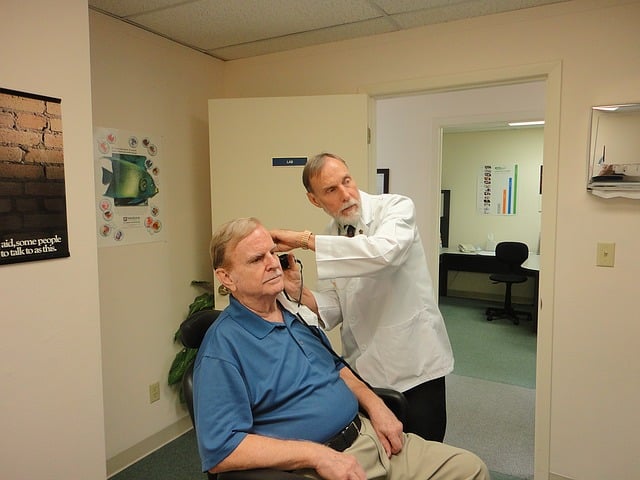Contents
First, what makes you think your parent has hearing loss?
The usual signs are that they frequently ask to have something repeated or fail to grasp the complete sense of a conversation. The most telling sign is that when alone, they turn the TV sound up to an uncomfortable level for most listeners.
You are quite right to be concerned. Not only is it frustrating for you as a speaker to talk loudly, perhaps, even to shout but, more significant it can be dangerous to anyone hard of hearing. Think, for example, the everyday sounds, traffic noises, warning shouts, or alarms that rely on good hearing to keep our lives safer.
These are immediate problems, particularly for an otherwise active senior but, just as significant are the longer-term impacts. One of the more severe consequences is social isolation. Hearing loss can lead to a lack of interest in conversation and interpersonal involvement. Suffers of hearing loss may actively avoid activities that would expose their difficulties to other people, i.e., avoid embarrassment. This lack of social interaction can lead to ‘loneliness and depression. These symptoms are severe enough but can accelerate the rate of hearing loss and even lead to irreversible damage.
We should be clear; hearing loss is a natural part of the aging process. It is one of the most common conditions affecting older and elderly adults. 25% of Americans aged 65 and older have a disabling hearing loss. ( Age-Related Hearing Loss (Presbycusis) — Causes and Treatment (nih.gov)).
Hearing loss is the third most prevalent condition in older adults (Source: National Institute on Deafness and Other Communication Disorders)
Luckily it is relatively straightforward, in most cases, to compensate for age-related hearing loss. The most crucial factor is to treat hearing loss as soon as possible. Your first course of action should be to visit your primary care physician, and treatment may be as simple as removing accumulated earwax or treating an infection.
The next step is a visit to a licensed audiologist. Ask the physician for a referral.
That sounds easy enough, but as we all know, nobody, especially the elderly, likes to be told that they have a problem. It is generally better that they recognize and accept the situation for themselves.
We offer these questions as an informal way of initiating a discussion. After all, you probably know the answers already. The important thing is to bring the subject into the open.
- How much do you think difficulties with your hearing limit your personal or social life?
- Do you become frustrated when conversing with the family because you have difficulty understanding them?
- Do you have misunderstandings due to a hearing problem that cause you to argue with family members?
- Do you have the TV or radio levels louder when you are on your own? s?
- Is it sometimes embarrassing to meet new people because you struggle to hear them correctly?
- Would you feel less restricted in your activities if you could improve your hearing?
- Are you conscious of missing some of the dialogs when you go to the movies or the theater?
- When you are out in public, such as in a restaurant, do you find it hard to distinguish what the family and friends are saying?
- When the TV or radio levels are loud enough for the rest of the family, do you have difficulty following the plot?
And if your parent is working
- Does your hearing limit your interaction with colleagues, clients, or customers?
These questions have been adapted from the works of Newman, C.W., Weinstein, B.E., Jacobson, G.P., & Hug, G.A. (1990). The Hearing Handicap Inventory for Adults [HHIA]
How much will it cost?
A consultation with a physician will be your parent’s standard rate. After that, charges will be according to the specialist your parent chooses to consult. In the majority of cases, i.e., a typical age-related hearing loss, this will be a hearing aid specialist licensed by your state to conduct and evaluate basic hearing aid tests, offer to counsel, and fit and test hearing aid
The cost of a hearing aid may vary from as little as $500 per ear to $6000 and beyond. Of course, the features vary but the main factor is size and visibility. We remarked earlier no one chooses to display a perceived weakness, hence the preference for discreet, hidden, invisible hearing aids. The median, the most popular, price is about $2500-$3300 per ear.
Do ACA-compliant plans include treatment for age-related hearing loss?
As a general rule, they do not, but some states mandate coverage for hearing aids. You should check with your insurer or group plan coordinator or your state exchange. If you do have coverage, it will be limited to a maximum sum over a set period.
Seniors enrolling on Medicare Advantage plans or Medicare part ‘D’ can include hearing aids in their coverage.
Most providers can facilitate an extended payments plan, typically 2-3 years. These plans help to spread the cost of your investment over the lifetime of the equipment and make good hearing more affordable.
NOTE: Hearing assessments are among the ten Essential Health Benefits (EHB) mandated by the ACA for infants. Most serious hearing disorders are detectable at this stage. Some states extend this mandate for young adults (to age 16-18 dependent on your state).
Finally, not all hearing loss is due to the aging process. It may be due to other causes such as prolonged exposure to extreme noise in the work environment, or at the other extreme, at a nightclub or pop concert. In the case of a workplace incident, either traumatic or chronic, you may be covered by your employer’s insurance.

